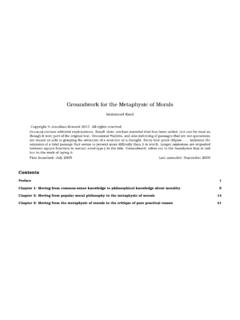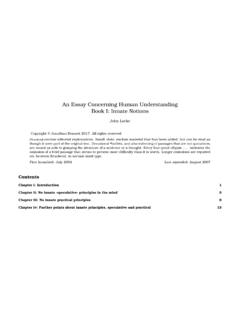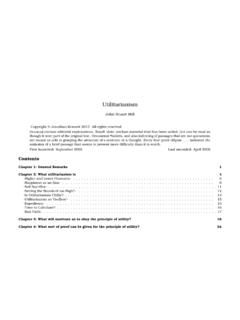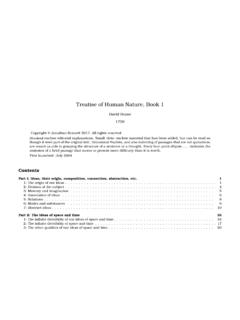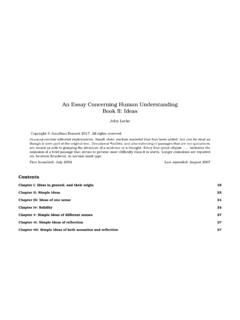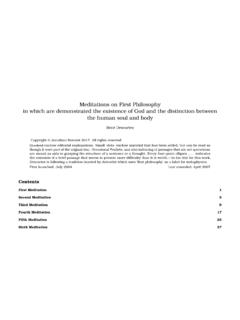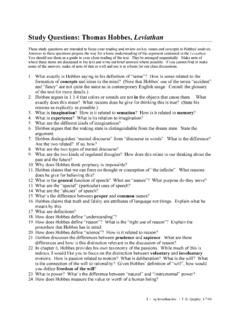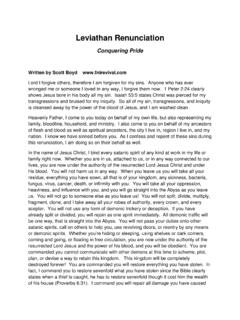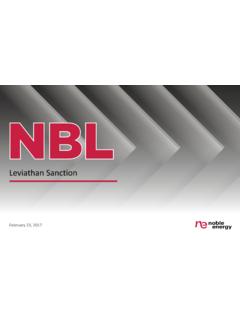Transcription of Leviathan Part 1: Man - Early Modern Texts
1 LeviathanPart 1: ManThomas HobbesCopyright Jonathan Bennett 2017. All rights reserved[Brackets]enclose editorial explanations. Small dots enclose material that has been added, but can be read asthough it were part of the original text. Occasional bullets, and also indenting of passages that are not quotations,are meant as aids to grasping the structure of a sentence or a thought. Every four-point ellipsis .. indicates theomission of a brief passage that seems to present more difficulty than it is worth. Longer omissions are reports,in [brackets], in normal-sized wroteLeviathanin Latin and in English; it is not always clear which parts were done first in Englishand which in Latin. The present text is based on the English version, but sometimes the Latin seems better and isfollowed instead.
2 Edwin Curley s fine edition of the English work (Hackett, 1994) has provided all the informationused here regarding the Latin version, the main lines of the translations from it, and other information includedhere between square brackets. Curley has also been generous in his personal help with difficult passages in theEnglish version. The name Leviathan comes from the Book of Job, chapter 41. See Hobbes s chapter 28, launched: July 2004 Last amended: July 2006 ContentsIntroduction1 Chapter 1. Sense3 Chapter 2. Imagination4 Leviathan 1 Thomas HobbesChapter 3. The consequence or train of imaginations8 Chapter 4. Speech11 Chapter 5. Reason and science16 Chapter 6. The interior beginnings of voluntary motions, commonly called the passions, and the speeches by whichthey are expressed21 Chapter 7.
3 The ends or resolutions of discourse28 Chapter 8. The virtues commonly called intellectual, and their contrary defects30 Chapter 9. The various subjects of knowledge37 Chapter 10. Power, worth, dignity, honour, and worthiness38 Chapter 11. The difference of manners44 Chapter 12. Religion48 Chapter 13. The natural condition of mankind as concerning their happiness and misery56 Chapter 14. The first and second natural laws, and contracts59 Chapter 15. Other laws of nature66 Chapter 16. Persons, authors, and things personated74 Leviathan 1 Thomas HobbesIntroductionIntroduction[Hobbes uses art to cover everything that involves thoughtful plan-ning, contrivance, design, or the like. The word was often used incontrast to nature , referring to everything that happens notartificiallybutnaturally, without anyone s planning to make it happen.]
4 Hobbesopens this Introduction with a rejection of that contrast.]Nature is the art through which God made the world andstill governs it. The art of man imitates in it many ways, oneof which is its ability to make anartificial animal. Life is justa motion of limbs caused by some principal part inside thebody; so why can t we say that all automata (engines thatmove themselves by springs and wheels as a watch does)have an artificial life? For what is the heart but a spring?What are the nerves but so many strings? What are the jointsbut so many wheels enabling the whole body to move in theway its designer intended? Art goes still further, imitatingthat rational and most excellent work of nature,man! For byart is created that greatLeviathancalled a commonwealth or state , which is just an artificial man though biggerand stronger than the natural man, for whose protectionand defence it was intended.
5 Here are some details of theanalogy between a commonwealth and a natural man .The chief authority in the commonwealth is an artificial soul, giving life and motion to the whole body as thesoul does to the body of a natural man ;the magistrates and other officers of the law are artificial joints;reward and punishment are artificial nerves; they areconnected to the seat of the chief authority in such away that every joint and limb is moved to do his duty,as natural nerves do in the body of a natural wealth and riches of all the members of the common-wealth are its strength;the people s safety is the commonwealth s business;advisors, by whom everything it needs to know is sug-gested to it, are its memory;justice is its artificial reason;laws are its artificial will;civil harmony is its health;sedition is its sickness.
6 Andcivil war is its , the pacts and agreements by which the parts of thisbody politicwere at first made, put together, and united,resemble thatfiat that Let us make man pronounced byGod when he was creating the describe the nature of this artificial man, I will con-sider: In part 1 : what the commonwealth is made of (men)and who made it (men). In part 2 : How and through whatagreements the commonwealth is made; what are the rightsand legitimate power or authority of a sovereign; and what itis that can preserve a commonwealth and what can dissolveit. In part 3 : What is a Christian commonwealth. In Part4 : What is the kingdom of the first topic, there is a saying that hasrecently become fashionable, thatWisdom is acquired not by reading books but byreading the basis of this, people who show few other signs ofwisdom take pleasure in showing what they think they have read in men by saying nasty things about them behindtheir backs.
7 But there is another saying not properlyunderstood in recent times through which men might learn1 Leviathan 1 Thomas HobbesIntroductiontruly to read one another, if they would take the trouble. Thesaying isNosce teipsum[Latin for know yourself ] read has come to be used to excuse the barbarous conductof men in power towards their inferiors, or to encouragemen of low degree in disrespectful behaviour towards theirbetters. But that s not what it was meant for. It was meant to teach us that if you are interested in the similarity ofthe thoughts and passions of one man to those of another,you should look into yourself, and consider whatyoudowhen you think, believe, reason, hope, fear, etc. and onwhat grounds you do so. That will enable you to read andknow what the thoughts and passions of all other men areon similar occasions.
8 I say the similarity of passions, whichare the same in all men desire, fear, hope, etc. not thesimilarity of theobjects ofthe passions, which are the thingsdesired, feared, hoped, etc. There is less similarity amongthese , because what a person wants, fears, etc. dependson his individual character and upbringing. The objects ofsomeone s passions are also harder to know about, because they are easy for him to hide; so much so that the writing ina man s heart (to continue with the reading metaphor), soblotted and mixed up by dissembling, lying, faking and falsebeliefs, can be read only by someone who can search can sometimes learn from men s actions what they are upto; but to do this without comparing those actions with ourown while taking into account all the relevant differences,is to decipher without a key, and to be for the most partdeceived by too much trust or too much distrust, dependingon whether the reader is himself a good man or a bad , however skilled someone is at reading othersby their actions, that can serve him only with the few peoplehe knows personally.
9 Someone who is to govern a wholenation must read in himself not this or that particular manbutmankind. This is hard to do, harder than learning anylanguage or science; but when I have set before you in andorderly and clear manner my own reading of myself , youwill be left only with the task of considering whether it alsoapplies to you. There is no other way to prove a doctrine ofthis 1 Thomas Hobbes1. SensePart 1. ManChapter 1. SenseConcerning the thoughts of man, I will consider themfirst taken one at a time, and then in a sequence with onethought depending on another. Each single thought is arepresentation or appearance of some quality or feature ofa body outside us what we call anobject. Such objectswork on the eyes, ears, and other parts of a man s body,and by working in different ways they produce source of all those appearances is what we callSENSE;for there is no conception in a man s mind that wasn tfirst either as a whole, or in parts produced through theorgans of present purposes it isn t necessary to know what thenatural cause of sense is, and I have written about that atlength elsewhere.
10 Still, to make my presentation complete, Iwill briefly discuss it cause of sense is the external body or object whichpresses the organ proper to each sense either immediately,as in taste and touch; or through an intermediary, as in see-ing, hearing, and smelling. This pressure is passed inwards,along the nerves and other strings and membranes of thebody, to the brain and heart; there it causes a resistance,or counter-pressure, or endeavour by the heart to deliveritself[= to disburden itself , to speak what is on its mind ]. Becausethis endeavour (or counter-pressure) isoutward, it seemsto be some matter outside the body; and this seeming, orfancy[= mental representation or image ]is what we call sense .For the eye it consists in shaped light or colour; for the ear,in a sound; for the nostril, in an odour; for the tongue andpalate, in a taste; and for the rest of the body, in heat, cold,hardness, softness, and such other qualities as we detectthrough touch.

